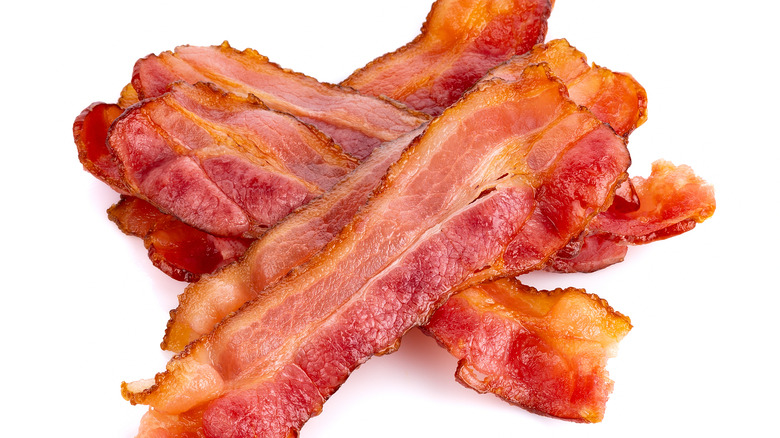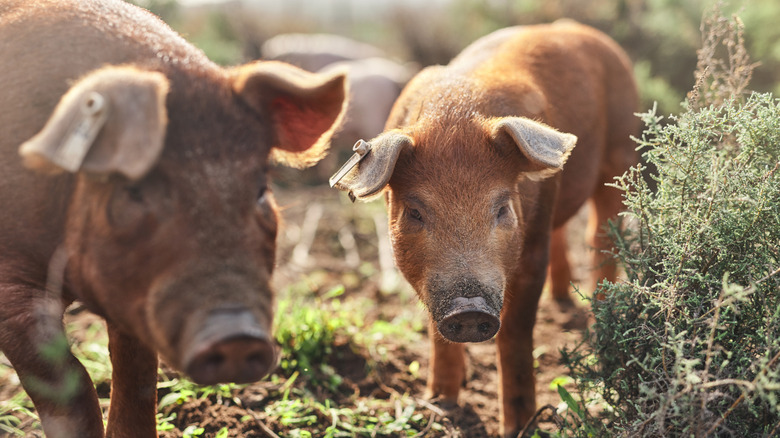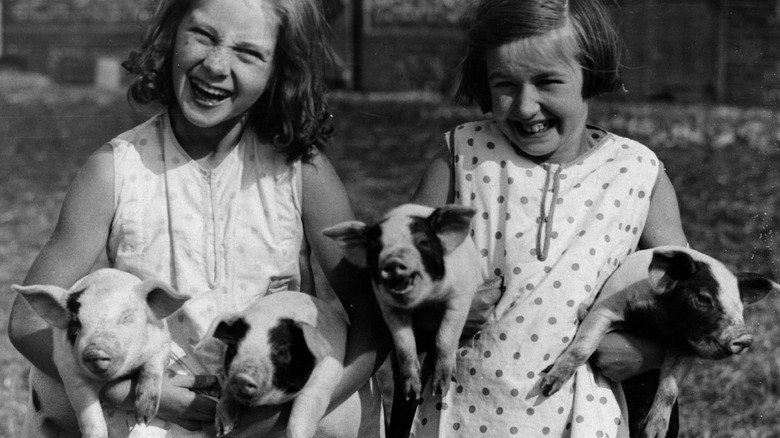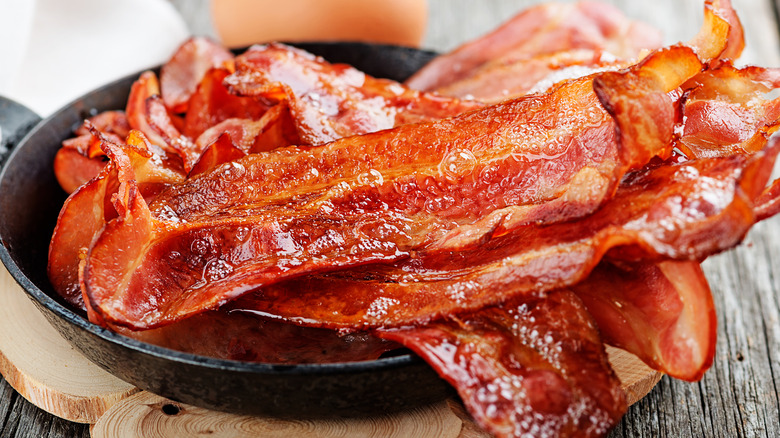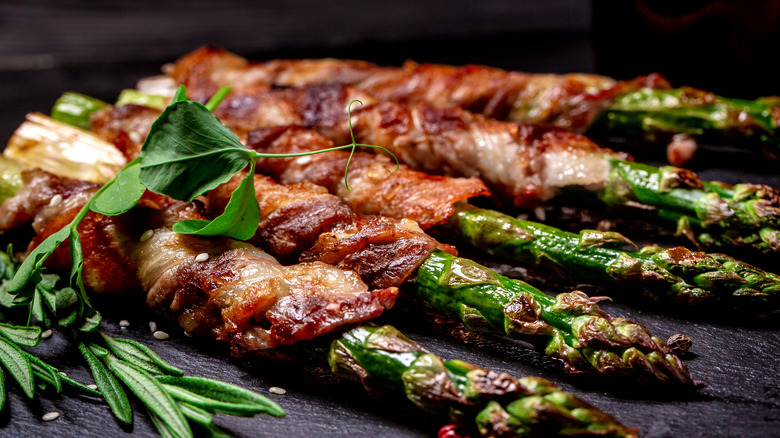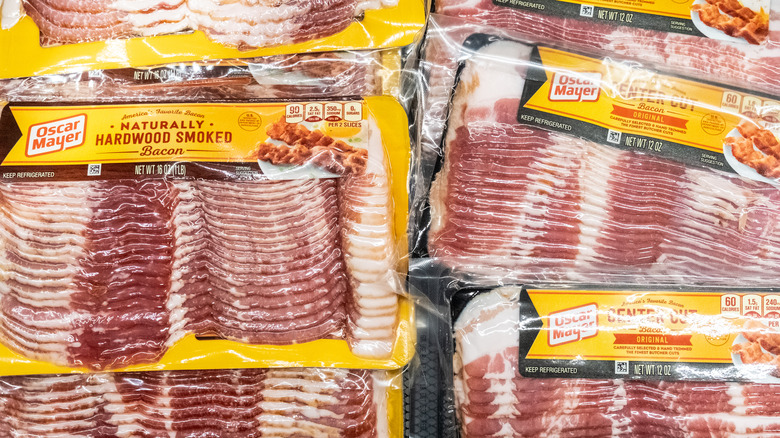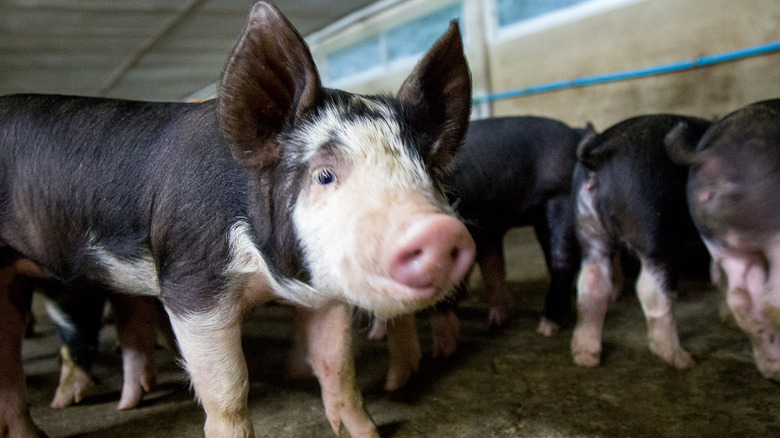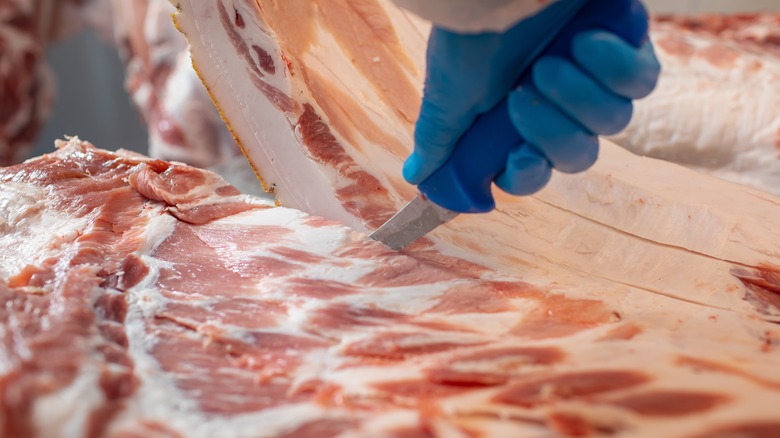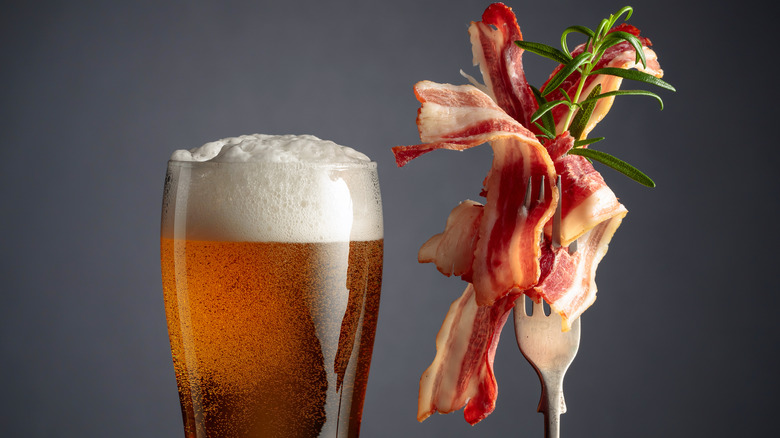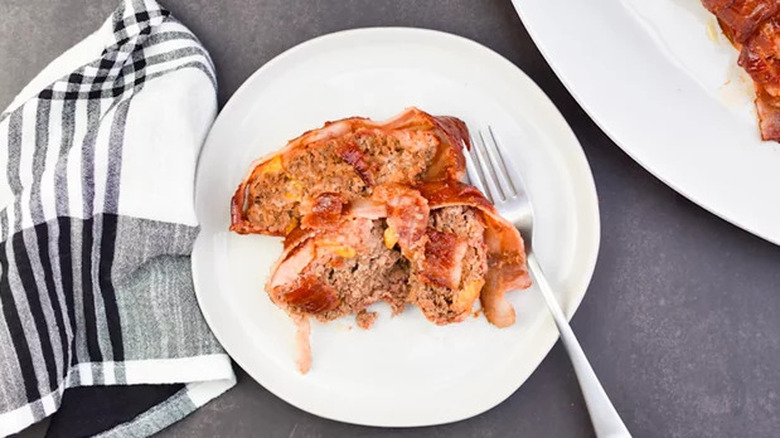The Fascinating, Untold Truth About Bacon
Bacon has been consumed by many people, from many nations, over many millennia. But what they called bacon, and what we now think of as bacon, wasn't always the same thing. For most of the time that the word "bacon" has been used — or bakkun, baken, or bacun, depending on which part of Europe you hailed from — it could be applied to almost any salted cut of pork. However, it wasn't until the 17th century when the English applied their term to the parts of the pig we now consider the true source of bacon, that the modern usage became the norm.
There's something about bacon that discourages complex thoughts. Maybe it's the intoxicating, vegetarianism-denying aroma, or the sweet, salty, crispy deliciousness that serenades your tastebuds when you take a bite, or the slightly sinful, guilt-inducing, neanderthal-brain-satisfying greasiness of it that makes seriously thinking about anything else utterly futile. But the fact is, bacon is no culinary wallflower — if it's there, you know it because it demands your attention. And every time we take a bite, it brings along enough stories, baggage, and hate-mail to bore ten thousand grandpigs — but we don't listen because we're too busy eating it. So, since you weren't paying attention, here is the untold truth about bacon.
What bringing home the bacon actually means
Anyone who brings a bit of bacon into the home has got to be pretty decent human being, especially if they share it with you. But the origins of the phrase "bringing home the bacon" are rooted more strongly in the world of morality than you might have supposed. Back in the 12th century, a small church in the village of Dunmow, England sought ways to improve marital harmony — what they came up with was a tribute to pragmatic decision making. Any man who could swear before God and the church's congregation that he had not argued with his wife for at least a year and a day, was rewarded with a side of bacon. So, assuming that every man who received the grand prize was telling the truth, he not only got a minimum 366 days of marital bliss, but a slab of pork awesomeness to take home at the end of it. This can mean only one thing: bacon truly is a gift from God.
We once made bacon from our own pet pigs
Before the process of bacon production was industrialized, it was up to individual families, in their own homes, to meet their own needs. If you're going to make your own bacon, you're going to need pigs, so it was common for families to keep their own small herds of oinkers, which they bred and butchered as needed. That's all very well if you're willing to part with beloved pets, and if you live on a couple of acres in the countryside. But if you live in the middle of a city, and the only free space you have is in the basement, then things could get a bit problematic. However, if you were brave enough to keep a powerful methane generator in your (probably badly ventilated) basement, then you at least had the benefit of a decent supply of God's Gift to make shoveling pig manure worth the effort.
There are so many varieties of bacon
Although the love of bacon transcends almost all man-made barriers, depending on where you come from, the bacon itself can vary quite a bit. The classic crispy American-style bacon is cut from the side of the pig's belly, and much like the design of the "Red, White, and Blue", it features red and white lines of fat, alternating with meat. The Canadian variety, also popular in Ireland and the UK, is cut from the loin, and with less visible fat, is a leaner and healthier cut of meat. It is also usually cut thicker, and not cooked to the point of being crispy. Italians prefer a cut similar to Americans, though they call it pancetta, and make it look quite a lot classier.
It's healthier than you thought
As a general rule, anything that tastes awesome probably isn't very good for you, and bacon is sadly no exception. It's full of salt, fat, and nitrites which have been blamed for causing heart disease, among many other unpleasant ailments. Obviously, the threat of deadly consequences has never been enough to stop a true bacon aficionado, so good news for them: bacon can actually be good for you, albeit in moderation. Since it's largely meat, bacon contains lots of protein, which helps you feel full and keeps hunger at bay. If you choose Canadian bacon, or some other lean variety with as few nitrites as possible, a small-yet-sensible amount can offer very real advantages.
What's more, bacon is so delicious that it very often has a tangible calming effect on people eating it. Plus, if you're an athlete, the high-protein, low-carb combo of bacon could be just what you need to help you train effectively. Baseball pitchers should wash their hands after eating it, however, just to keep things fair.
We're taking it way too far
Bacon tastes great nearly every way you can eat it: bacon cheeseburgers, bacon-wrapped hot dogs, the traditional bacon and eggs, and just a big ol' bucket of bacon. However, people's obsession with stripey meat Heaven has inspired a whole new industry that seeks to add bacon to everything it possibly can, whether that thing is edible or not. Hence we have almost everything bacon, from the mostly innocuous bacon salt, through bacon soap and lip balm, to the truly bizarre bacon-flavored sex lube, condoms, and even coffins. It is now possible to incorporate bacon and bacon flavor into almost every aspect of your existence, and while most of these products are gags (albeit working gags), the fact that they exist at all demonstrates how deep into our souls the bacon flavor has soaked. Bacon might be a gift from God, but that doesn't mean He likes the taste of it.
Bacon might help you with your hangover
Just when you thought bacon couldn't get any better, it turns out the salty, crunchy treat may be able to alleviate one of the peskiest physical ailments around. According to researchers in England, bacon can help cure a hangover (via Marie Claire).
"Food doesn't soak up the alcohol, but it does increase your metabolism – helping you to deal with the after-effects of over-indulgence," said Elin Roberts, science development manager at the Centre for Life in Newcastle. More specifically, she says a bacon sandwich will help get you back on your feet the morning after imbibing. "Bread is high in carbohydrates and bacon is full of protein, which breaks down into amino acids... Bingeing on alcohol depletes neurotransmitters too, but bacon contains a high level of amines which tops these up, giving you a clearer head."
Of course, bacon isn't the only high-protein breakfast option out there. If you're craving a different flavor profile to nurse you back to health, try some good old-fashioned scrambled eggs, a breakfast burrito, or even simple bowl of yogurt.
Oscar Mayer was the first company to sell packaged, pre-sliced bacon in the U.S.
Nowadays, we can cook up strips of bacon in no time, thanks in large part to the fact that it is sold in convenient packages of pre-sliced meat. But that wasn't always the case. According to the book, "Pigs, Pork, and Heartland Hogs," prior to World War I, bacon was only sold in four to 10 pound slabs of meat. That began to change in 1915, when some producers started selling pre-sliced bacon.
At the same time pre-sliced bacon was gaining popularity, German immigrant Oscar Mayer and his eponymous Chicago meat company was making strides in the Midwest. The business had experienced tremendous success by finding new ways to separate itself from the competition. It was one of the first meat purveyors to brand its products, for example, and to get its products approved by the Food Safety Inspection Service. That ingenuity continued when Carl Mayer, Oscar's nephew, concluded that bacon would sell better if it was pre-sliced, the way cheeses and lunch meat were. From that idea came Oscar Mayer's new bacon packaging, featuring individual, shingled slices wrapped in cellophane within a cardboard frame.
The new packaging first hit the shelves in 1924 and was an immediate success. The Oscar Mayer company went from a minor player in the bacon industry to its top seller. By the middle of the 20th century, nearly all commercial bacon was sold in slices.
Specific breeds of pigs are used for bacon
Not all pigs are created equal. That's particularly true when it comes to procuring bacon. There are dozens of different pig breeds found around the globe, according to Livestock of the World. Yet, here in the United States, only a select few are typically used to make bacon.
So, what qualities make for a good bacon pig? According to Family Farm Livestock, the perfect pigs are those that have some fat but not too much fat. (A strip of bacon has plenty of fat but also plenty of meat.) Commercial producers also want pigs that grow fast and are readily available.
One of the most oft-used breeds for bacon is the Yorkshire pig. According to PorkCheckogg.org, it is the most popular breed in North America, and found in nearly every state. The Yorkshire is known for its abundance of lean meat and low backfat. The second-most abundant swine, the Duroc, is also commonly used for bacon production due to its ability to gain lean weight quickly. The Berkshire, a pig known for its fast growth and flavorful meat, is another popular choice for bacon producers, as well as the Hampshire, Poland China, and Spotted.
Ancient Romans ate bacon, but called it something else
The origins of the word "bacon" can be traced back to the Middle Ages, but the food we know today as bacon goes back even further -– to the days of ancient Rome. According to the South Florida Reporter, early Romans came up with the first known examples of the cured pork product. They did not call it bacon, however. Instead, the food was referred to as "petaso."
How bacon came to be during this time is straightforward enough. Because pigs are easily domesticated, they were a popular choice to own as livestock, according to the Baconer. Furthermore, Romans used several preservation techniques to keep meat from spoiling. Among them were adding salt to and/or smoking the meats (via The Daily Mail). Pork plus salt plus heat equals bacon.
Aside from the name, there was another significant difference between this bacon and the product we know today: the preparation. As opposed to the traditional method of first curing raw bacon, Romans would boil the meat, then brown it, and finally season it as the final step.
Englishman John Harris opened the first commercial bacon processing plant
The name John Harris probably doesn't ring a bell, but if you're a bacon lover, you owe him a debt of gratitude. This 18th-century Englishman is credited as the forefather of industrial bacon manufacturing (via English Breakfast Society).
During the 1700s, most of the pigs in England were imported from Ireland, according to Smithsonian Magazine. But transporting meat across the country was impossible without refrigeration. Because of this, handlers would herd the animals on foot hundreds of miles. The problem with this system is that walking 100 miles would turn these plump pigs into lean animals, thus eliminating their fatty, tender meat. To prevent this from happening, herders would make frequent stops along the way. Harris owned a butcher shop in the southwestern county of Wiltshire, just off the coast of the Irish Sea (per English Breakfast Society). The location made for a perfect resting place for pig herders. In turn, this meant Harris had an ample supply of pigs.
In the 1770s, Harris opened the first commercial bacon processing plant. He also helped establish Wiltshire as "the bacon capital of the world," thanks in part to a unique curing method. With Wiltshire bacon, the two sides of the pig are separated and cured whole, rather than being broken down into even smaller pieces. The cure used to flavor the meat created a sweet, low-salt bacon that is still popular today.
Bacon eaters may also be guilty of some other unhealthy habits
If you eat a lot of bacon, you're probably indulging in some other unhealthy habits — at least, that's what scientists say. In a study examining the connection between meat consumption and premature death, researchers found that people who ate more red meat were more likely to be smokers and drink more alcohol than those who consumed less red meat. A group of Harvard researchers found similar lifestyle patterns, with the additional discovery that red-meat eaters tend to exercise less as well.
The first study also found that meat eaters generally consume fewer fruits and vegetables. This shouldn't be too surprising, at least when it comes to bacon. After all, the salty meat is commonly consumed as part of a larger, plant-free meal. "Bacon is usually part of a not-so-healthy meal like bacon and eggs with toast and butter — no produce — or in a sandwich with lots of mayonnaise and other processed meats," registered dietitian nutritionist Sonya Angelone told WebMD. "It comes back to what you're eating overall."
Both studies found that those who consumed the most meat were likelier to die at a younger age. So, you may want to swap out that bacon for an apple every once in a while.
Bacon may have some lesser-known positive side effects
We all know about the unhealthy aspects of bacon. But behind that fat, sodium, and cholesterol are several nutrients that can have surprisingly beneficial effects on a person's health. A group of researchers in Switzerland determined that the high levels of niacin found in bacon could help you live longer (via ETH Life). They came to this conclusion after observing roundworms that ate a niacin-rich diet lived 1/10 longer than those that didn't consume the vitamin at all.
In 2010, a team of University of North Carolina researchers published a study in The FASEB Journal concluding that the nutrient choline, which is found in bacon, is critical in helping fetal brain development. "Our study in mice indicates that the diet of a pregnant mother, especially choline in that diet, can change the epigenetic switches that control brain development in the fetus," said Steven Zeisel, the group's senior scientist.
Both pork and chicken eggs contain choline, meaning a bacon and eggs breakfast could provide a nutritious benefit for a pregnant woman. "We may never be able to call bacon a health food with a straight face, but the emerging field of epigenetics is already making us rethink those things that we consider healthful and unhealthful," said Gerald Weissmann, MD, the editor-in-chief of the FASEB Journal.
Bacon isn't just for breakfast
Bacon is a breakfast staple, but should such a delectable bite be confined to just a portion of the day? We certainly don't think so. With that in mind, why not expand your bacon horizons?
A grilled cheese sandwich is always a great choice for a lunchtime meal. How about upping the ante on the traditional version of this classic sandwich by wrapping the whole thing in bacon? Sound complicated? Don't worry, it takes less than 15 minutes to make. If you want to simplify it even further, just cut out the cheese for a tasty bacon sandwich, or as they say across the pond, a bacon butty.
If you have some time on your hands and are looking to incorporate bacon into your dinner, you can make an extra-hearty bacon-wrapped meatloaf. Those looking for a lighter meal can whip up this copycat version of Olive Garden's Zuppa Toscana soup, which has both bacon and sausage. While we're on the topic of dinner, don't forget about the complementary dishes. Spooned over crackers or toasted bread, this tomato bacon jam would make for a perfect appetizer. In need of a savory side dish? Try these easy-to-make baked beans with bacon, which can be prepared in less than 40 minutes.
Of course, no meal would be complete without dessert. If you think a salty, savory item like bacon can't be incorporated into a deliciously sweet dessert, these chocolate bacon cupcakes will make you a believer.
